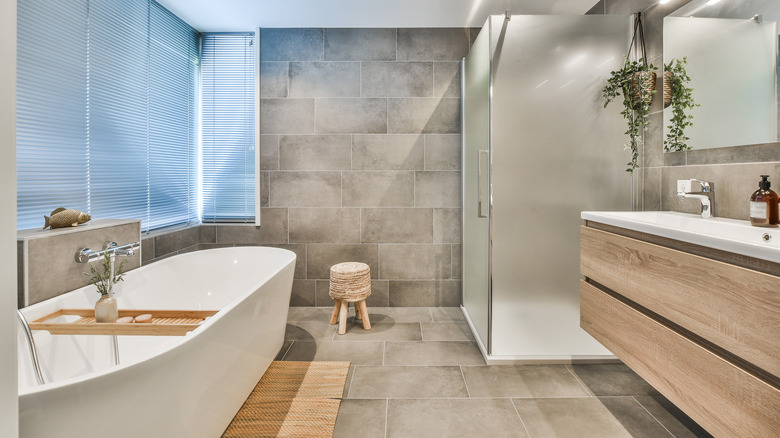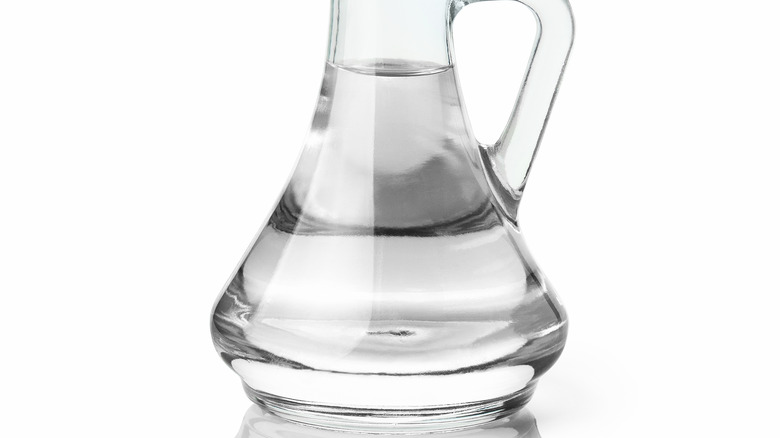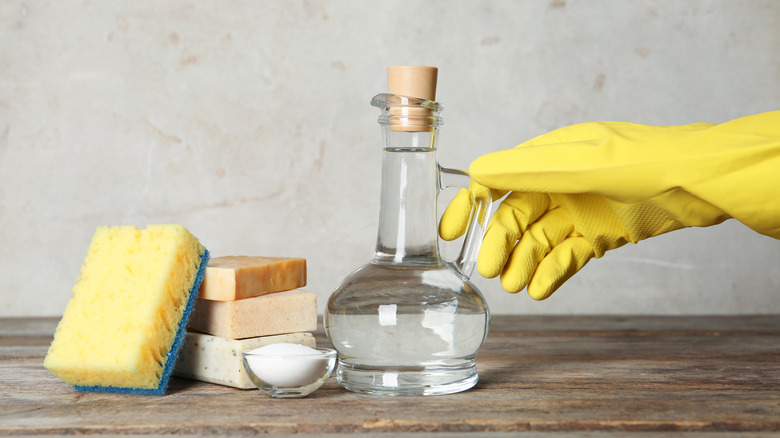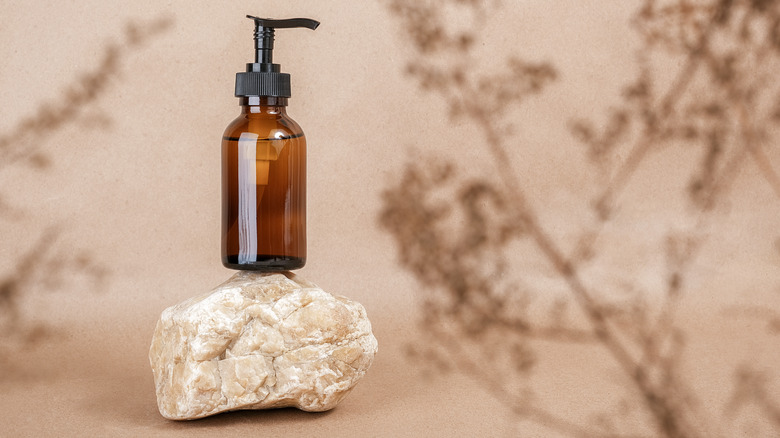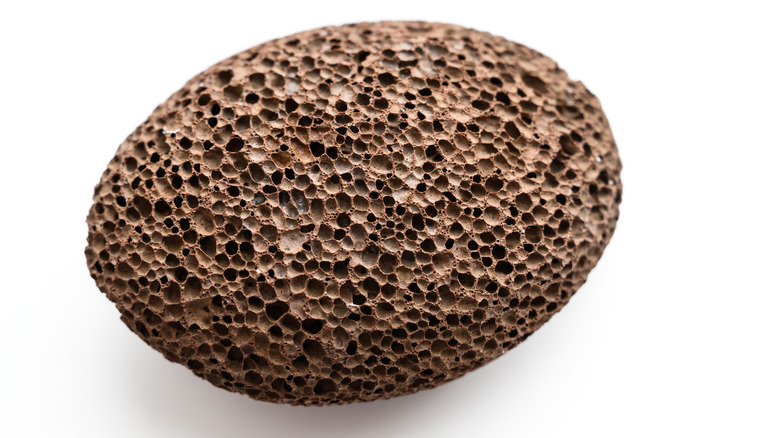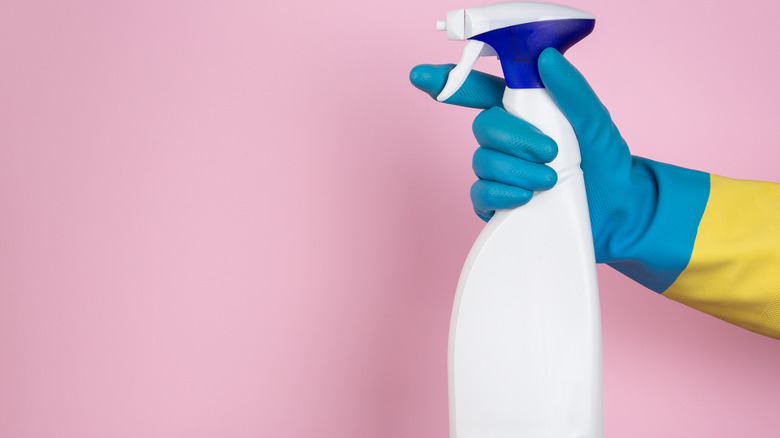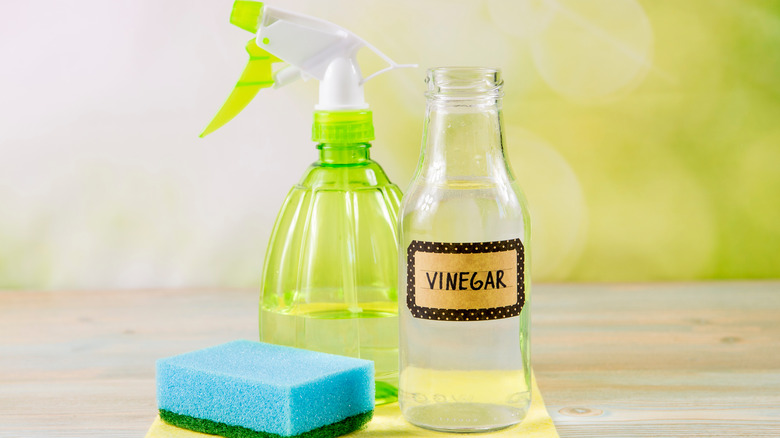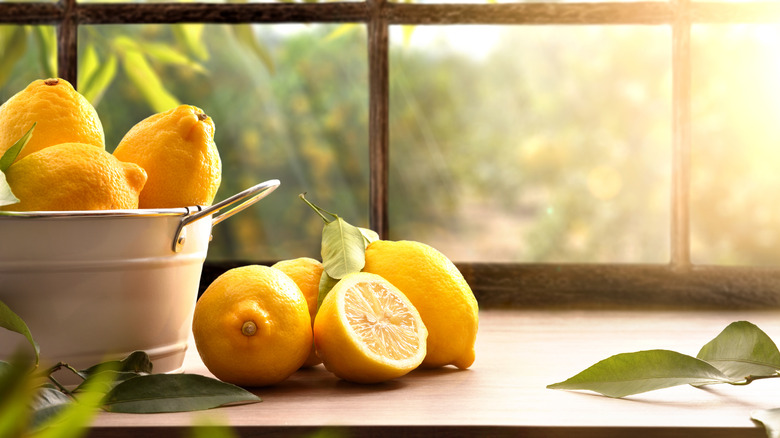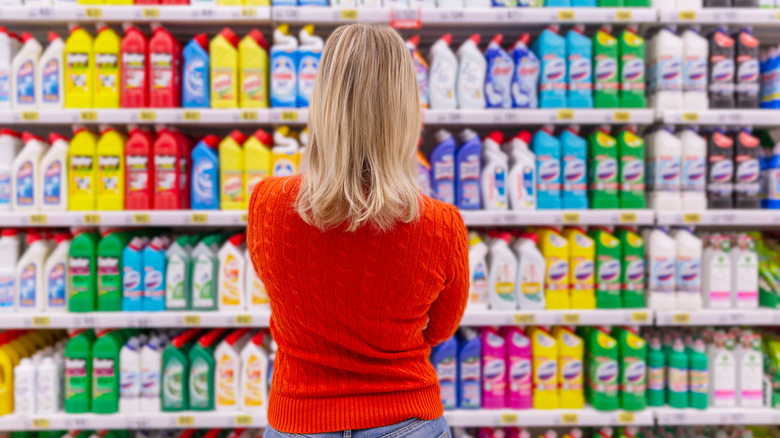8 Easiest Ways To Clean Soap Scum Off Your Bathroom Surfaces
Anyone who has ever peered with dissatisfaction at that residue that seems to cling to things like your tiles, glass, or fiberglass shower door, stainless steel or chrome fixtures, and even your plastic shower curtains, will know just how frustrating soap scum can be. This particular substance occurs when the ingredients in soap react with the minerals found in water, creating that unappealing chalky residue that you want to scrub off ASAP, as noted by The Spruce. And, to make matters worse, it becomes increasingly difficult to remove when you allow it to build up.
Luckily, there are a lot of great cleaning solutions that will help you eliminate that pesky soap scum from all the surfaces it clings to, allowing you to enjoy a truly sparkling clean bathroom. It can seem daunting when it's allowed to build up, but if you make removing that soap scum a regular item in your normal cleaning routine, you'll be done in no time at all; it's far easier to handle a week's worth of build-up rather than trying to remove months of it at a time.
The one important thing to consider is exactly what you're trying to clean, as in many cases, you'll want to use different substances to clean your natural stone or ceramic tiles than you'll want for your stainless steel faucet or glass shower door. Add a few of the cleaning solutions from the following list to your cleaning arsenal, and say goodbye to soap scum.
1. White vinegar
When it comes to natural cleaning ingredients, white vinegar is an absolute powerhouse that is incredibly effective, yet gentle enough to be used on a variety of surfaces, per The Spruce. It can be essential for cleaning some surfaces in your bathroom that are a bit more challenging, like a plastic shower curtain or your shower head. In both instances, you'll want to soak the item in vinegar.
For a shower head, since you likely don't want to bother removing the fixture from the wall, you can instead fill a plastic bag with vinegar and submerge the entire shower head in it, using an elastic to keep the vinegar-filled bag in place as it soaks for an hour or so. The same general process can be used for your shower curtains, although since those are relatively easy to take off the curtain rings, you can simply fill a container (or even just your tub) with equal parts vinegar and water, and allow the curtain to soak for several hours, ideally overnight.
In both cases, you'll want to wipe off and rinse the fixture or item with water afterwards to remove that vinegar. This tip is fantastic because white vinegar is incredibly easy to find, and there's a good chance you have it on hand already.
2. Baking soda and vinegar
When it comes to cleaning your fiberglass or porcelain bathtub, it can be a bit nerve-wracking to use anything too aggressive or abrasive — you don't want to scratch or damage that surface in any way. However, if you live in an area with particularly hard water, or you just love to indulge in frequent baths, there's a chance that you'll need to do some soap scum removal in this area of your bathroom. Luckily, the solution is quite simple, and is likely already found in your pantry: baking soda and vinegar, according to Love To Know.
More specifically, you'll want to add about 1/4 to 1/3 cup of vinegar to 1 cup of baking soda. Allow the ingredients to foam, then apply the paste mixture to your tub with a sponge. To make the process a bit easier for yourself, you may want to allow it to sit for about 20 or 30 minutes to work its magic — then you can simply scrub the area and watch as the soap scum slides right off the surface.
3. Natural stone cleaner
Don't worry — if you have natural stone tiles in your bathroom, there's still a solution to remove that unwanted soap scum, although you do need to be a bit more cautious, says The Spruce. Even if you have commercial soap scum removers available, they're not something you want to use on natural stone because it can cause damage to the finish. Additionally, particular types of stone can respond differently to certain solutions, so you want to tread with caution here.
While there are often effective DIY solutions for cleaning surfaces, if you're battling soap scum on natural stone, you may want to simply spring for a tested natural stone cleaner in order to ensure your stone tile stays looking as gorgeous as when it was first laid. All you need to do is check the instructions to ensure you're using the cleaner properly, diluting it if necessary, and not leaving it on the stone tiles for longer than appropriate.
4. Pumice stone
In situations where you have some serious soap scum build up, you may need to add a bit of elbow grease into the equation in order to scrub off that residue. However, there are a few important things to take into consideration with this solution, per Bob Vila. First of all, when using a pumice stone, you want to first check what type of material you're dealing with — it can be effective on a porcelain or ceramic tub, but you want to steer clear if you have a fiberglass or acrylic shower or tub, as they can be a bit more delicate and sensitive to the pumice stone.
Additionally, you never, never want to use a dry pumice stone in order to remove soap scum. Keep the pumice stone wet, and also wet the soap scum covered surface you're trying to clean. Finally, pay attention to your technique. While you need a bit of elbow grease to remove the residue, you always want to be quite gentle to avoid scratching the surface you're attempting to clean.
5. Ammonia
Many people prefer to use gentler cleaning solutions such as vinegar or other eco-friendly alternatives, but sometimes, you need a bit more power in your cleaning solutions, which is where ammonia can come in. For this particular soap scum removal method, you'll want to mix one part of ammonia with about three parts water, advises HGTV. You can mix it in any vessel, but placing the mixture in a spray bottle will ensure you can aim the solution wherever you need it to go, a helpful trick if you're cleaning the soap scum off a surface like a shower door. All you need to do is cover the surface with a thin layer of the mixture, then gently scrub away at it until the residue is removed. Finish off the cleaning process by rinsing and drying the surface to remove any lingering ammonia.
There's just one thing to be careful of with this solution: the other cleaning supplies you're using in the space. Namely, you never want to use ammonia and chlorine-based bleach at the same time, as the two combined can create a dangerous gas that can be extremely damaging to your health (via Healthline). Also, for your own comfort, you'll want to try to ventilate the space where you're using the ammonia and water solution as well as possible, as this particular mixture has quite a strong odor.
6. Vinegar and dishwashing liquid
When it comes to finding a gentle way to clean your home, vinegar is often at the forefront of everyone's minds. It's easily accessible, it's something you likely have at home already, and it works on a wide variety of materials and areas in your home, rendering it a cleaning powerhouse. However, there are situations where just vinegar isn't quite enough to get the job done — that's where adding a bit of dishwashing liquid can help out, according to Sunrise Specialty.
Particularly for delicate materials like fiberglass, which is found in many showers and bathtubs and can be a common spot for soap scum to gather, a gentle solution is needed. Adding a few drops of your preferred dishwashing liquid to your plain white vinegar or apple cider vinegar creates a foam that can help loosen and lift those soap scum particles, with minimal scrubbing needed. As with many cleaning solutions, for best results, you'll want to allow the mixture to work it's magic for a few minutes before gently scrubbing and rubbing that residue away.
7. Lemon juice
When you're in the middle of deep cleaning your space, the last thing you want to do is run to the store to buy additional cleaning supplies; that's why it's so convenient when a cleaning solution involves an item you likely already have at home, although perhaps in a different location. To that end, when it comes to cleaning, lemon juice can be a total star since the acidity gives it some cleaning power while the scent adds some freshness to the bathroom you're busy scrubbing, per Molly Maid.
As an added bonus, this tip couldn't be easier. All you need to do is take a lemon, cut it in half, and then hold the skin side of the fruit while you rub the flat, cut, circular surface against that stubborn soap scum that simply doesn't want to get off your shower wall. If all you have is lemon juice, that can work as well, but using the whole fruit is convenient and saves you the step of dirtying a sponge to apply the juice to the scummy area. For particularly tricky spots, you can dip the lemon in salt in order to add a bit of abrasive power to the cleaning process. And, as with many solutions, allow the lemon juice to sit for about 30 minutes and work it's magic before you rinse away the soap scum.
8. Commercial cleaners
It can be both convenient and cost-effective to create cleaning solutions from ingredients you already have at home. However, there are certain situations where you just might need a commercially-developed product to eliminate a certain issue, and soap scum may be one of them. If you've tried a few different DIY solutions that just didn't work, or you simply don't have the patience to mix up various concoctions from pantry items in order to tackle that soap scum residue, don't worry — there are commercial cleaners on the market that can help, as noted by Love To Know.
One solution for particularly stubborn residue is a Magic Eraser, a tool with tiny micro scrubbers within it that can be extremely effective on tough-to-clean areas. There are also solutions like Scrubbing Bubbles or CLR that use different cleaning agents in order to dissolve and remove that unsightly residue. The one important thing when using a commercial cleaner is to carefully read the label in order to figure out exactly how you need to use that particular solution, such as whether scrubbing is necessary or whether you need to allow it to soak for a period of time. Additionally, make sure to note whether it says it's unsafe for any particular surfaces, as you certainly don't want to damage the finish on your bathroom fixtures in your attempt to clear away that soap scum.
